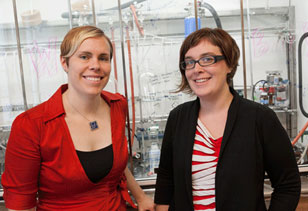Mar 5 2013
Indiana University Bloomington chemists Erin Carlson and Sara Skrabalak have been named Sloan Research Fellows, the Alfred P. Sloan Foundation announced. They are among 126 outstanding U.S. and Canadian researchers to receive the fellowships for 2013.
 Erin Carlson and Sara Skrabalak
Erin Carlson and Sara Skrabalak
Awarded annually since 1955, the fellowships are given to early-career scientists and scholars whose achievements and potential identify them as the next generation of scientific leaders. Carlson and Skrabalak are assistant professors in the Department of Chemistry in the College of Arts and Sciences.
"The Sloan Research Fellows are the best of the best among young scientists," said Paul L. Joskow, president of the Alfred P. Sloan Foundation. "If you want to know where the next big scientific breakthrough will come from, look to these extraordinary men and women."
Carlson's research centers around development and application of advanced chemical biology and systems biology technologies to define the mechanisms of bacterial pathogenesis and identify potential therapeutic agents. Her research group pursues the development of technologies for natural product discovery including innovative methods for compound isolation, screening and diversification.
She earned a B.A. from St. Olaf College and a Ph.D. from the University of Wisconsin-Madison and subsequently was awarded an American Cancer Society Postdoctoral Fellowship for studies at the Scripps Research Institute. A video of Carlson discussing her research and teaching is on the website of the Office of the Vice Provost for Research. Her work is also profiled in an NBC News "Science Behind the News" feature on drug-resistant bacteria.
Skrabalak and her associates conduct research in materials chemistry and in nanoscience, which concerns the unique properties of materials with dimensions of less than about one millionth of a meter. Her research emphasizes the development of new synthetic strategies to shape and architecturally-control nanomaterials for the study of how structure imparts functionality for applications in catalysis, chemical sensing, and separations.
She received a B.A. from Washington University in St. Louis and a Ph.D. from the University of Illinois at Urbana-Champaign. She did postdoctoral work at the University of Washington-Seattle.
Last year, Skrabalak and Carlson were among the 11 recipients of the Cottrell Scholar awards, a program that recognizes early-career researchers and promotes outstanding teaching. Both have also been awarded the National Science Foundation Faculty Early Career Development Award, the foundation's most prestigious award in support of junior faculty, Skrabalak in 2010 and Carlson in 2012.
The 2013 Sloan Research Fellows are drawn from 61 colleges and universities across the United States and Canada. Administered and funded by the Sloan Foundation, the fellowships are awarded in chemistry, computer science, economics, mathematics, evolutionary and computational molecular biology, neuroscience, ocean sciences and physics. To qualify, candidates must first be nominated by their fellow scientists and are subsequently selected by an independent panel of senior scholars. Fellows receive $50,000 to further their research.
The Alfred P. Sloan Foundation is a philanthropic, not-for-profit institution based in New York City. Established in 1934 by Alfred Pritchard Sloan Jr., then-president and chief executive officer of the General Motors Corp., the foundation makes grants in support of original research and education in science, technology, engineering, mathematics and economic performance. A complete list of Sloan Research Fellows is available online.